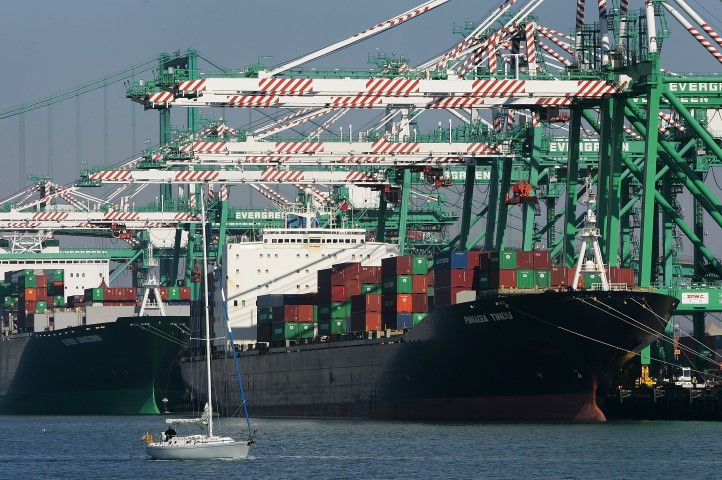August 3, 2015

This spring and early summer’s floating picket lines outside the ports of Long Beach, Los Angeles, and Oakland, Calif. which inflicted severe damage on Central California’s citrus, walnut, and cotton industries underscored the need for better labor relations in America.
Hundreds(?) of tons of tasty, ripe, and perishable California oranges occupied huge sea worthy containers on board dozens of ships that bobbed and rolled in the waters offshore California’s three major ports, going nowhere for months.
The ships contained huge volumes of California walnuts and cotton as well, destined for foreign ports. Those with the know-how and authority to move them overseas were embroiled in a bitter labor dispute pitting longshoremen against the port authorities.
Longshoremen are the guys we think of as tough, muscled up, hard-working specimens that load and unload containers and cartons coming into and going out of our international ports.
Port authorities are the organizations that manage the port facilities, directing shipments in and out, maintaining the facilities, and paying the salaries of longshoremen.
Movies have been made and headlines have been written about the perennial disagreements between the two. Slow-downs, strikes, and threats to initiate either are the standard weapons of the longshoremen.
The port authorities counter with threats of lockouts and shutdowns. Like shotguns, the weapons of both seem to spray their economic destruction well beyond their targets to innocents who depend on both.
China was not the only destination for the oranges, walnuts, and cotton in those floating container ships, but it was the main one. A substantial amount of the citrus was destined for retail sales to Chinese consumers in celebration of their New Year.
Nuts are big sellers at that time of year as well. Both commodities were late for their largest annual seasonal demand.
Citrus loss - $120 million plus
It was no wonder that some perishable citrus arrived in poor condition after floating around the California coast non-refrigerated for 8-10 weeks. Joel Nelsen, president of California Citrus Mutual in Exeter, which represents growers and packers, estimated losses to the citrus industry conservatively at $120 million.
Labor relations and bargaining between the longshoremen and the dock owners are not covered by the venerable Taft-Hartley law that oversees most of the bargaining efforts by employers and employees in other industries in the country.
Policy requires other means for ending extended or out-of-control disagreements between the two parties, namely federal intervention.
Remember the case of the air traffic controllers in 1981 where similar rules applied. President Ronald Reagan’s stern intervention preserved the industry, as striking traffic controllers were told to get back to work or get out. Tough times require tough action.
Federal intervention in the case of the longshoremen’s shutdown did not occur. Nobody in authority seemed to care enough about our country’s agricultural trade commitments to take necessary action, and the illegal dispute continued for months.
Some news stories reported that longshoremen’s annual salaries hovered in the $160,000 range. They also pointed out that much of the back-breaking labor demands on the docks have been replaced by power equipment and packaging improvements to practically eliminate heavy lifting.
Labor interests don’t seem to get it. Crying publicly and withholding services does not attract public sentiment. Instead, it destroys confidence in those services and undermines longstanding trade commitments.
In this case, the emotional display destroyed trust in America’s ability to conduct free trade. It was a rotten deal.
Another year and another season, and the agricultural industries involved will begin to recover. But the country’s reputation for fair and open trade has suffered severe damage that will not be quickly regained.
The patriotism and commitment to free trade by America’s labor interests need an overhaul.
You May Also Like




